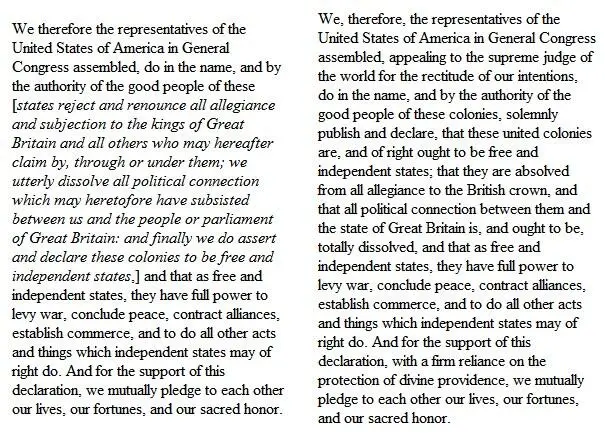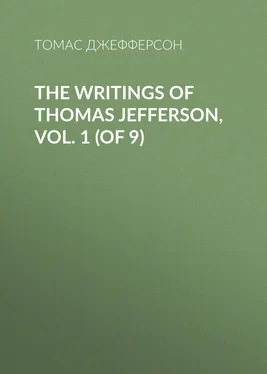Томас Джефферсон - The Writings of Thomas Jefferson, Vol. 1 (of 9)
Здесь есть возможность читать онлайн «Томас Джефферсон - The Writings of Thomas Jefferson, Vol. 1 (of 9)» — ознакомительный отрывок электронной книги совершенно бесплатно, а после прочтения отрывка купить полную версию. В некоторых случаях можно слушать аудио, скачать через торрент в формате fb2 и присутствует краткое содержание. Жанр: Биографии и Мемуары, foreign_antique, на английском языке. Описание произведения, (предисловие) а так же отзывы посетителей доступны на портале библиотеки ЛибКат.
- Название:The Writings of Thomas Jefferson, Vol. 1 (of 9)
- Автор:
- Жанр:
- Год:неизвестен
- ISBN:нет данных
- Рейтинг книги:5 / 5. Голосов: 1
-
Избранное:Добавить в избранное
- Отзывы:
-
Ваша оценка:
- 100
- 1
- 2
- 3
- 4
- 5
The Writings of Thomas Jefferson, Vol. 1 (of 9): краткое содержание, описание и аннотация
Предлагаем к чтению аннотацию, описание, краткое содержание или предисловие (зависит от того, что написал сам автор книги «The Writings of Thomas Jefferson, Vol. 1 (of 9)»). Если вы не нашли необходимую информацию о книге — напишите в комментариях, мы постараемся отыскать её.
The Writings of Thomas Jefferson, Vol. 1 (of 9) — читать онлайн ознакомительный отрывок
Ниже представлен текст книги, разбитый по страницам. Система сохранения места последней прочитанной страницы, позволяет с удобством читать онлайн бесплатно книгу «The Writings of Thomas Jefferson, Vol. 1 (of 9)», без необходимости каждый раз заново искать на чём Вы остановились. Поставьте закладку, и сможете в любой момент перейти на страницу, на которой закончили чтение.
Интервал:
Закладка:

The Declaration thus signed on the 4th, on paper, was engrossed on parchment, and signed again on the 2d of August.
[Some erroneous statements of the proceedings on the Declaration of Independence having got before the public in latter times, Mr. Samuel A. Wells asked explanations of me, which are given in my letter to him of May 12, '19, before and now again referred to. 11 11 See Appendix, note B.
I took notes in my place while these things were going on, and at their close wrote them out in form and with correctness, and from 1 to 7 of the two preceding sheets, are the originals then written; as the two following are of the earlier debates on the Confederation, which I took in like manner. 12 12 The above note of the author is on a slip of paper, pasted in at the end of the Declaration. Here is also sewed into the MS. a slip of newspaper containing, under the head "Declaration of Independence," a letter from Thomas M'Kean, to Messrs. William M'Corkle & Son, dated "Philadelphia, June 16, 1817." This letter is to be found in the Port Folio, Sept. 1817, p. 249.
]
On Friday, July 12, the committee appointed to draw the articles of Confederation reported them, and, on the 22d, the House resolved themselves into a committee to take them into consideration. On the 30th and 31st of that month, and 1st of the ensuing, those articles were debated which determined the proportion, or quota, of money which each state should furnish to the common treasury, and the manner of voting in Congress. The first of these articles was expressed in the original draught in these words. "Art. XI. All charges of war and all other expenses that shall be incurred for the common defence, or general welfare, and allowed by the United States assembled, shall be defrayed out of a common treasury, which shall be supplied by the several colonies in proportion to the number of inhabitants of every age, sex, and quality, except Indians not paying taxes, in each colony, a true account of which, distinguishing the white inhabitants, shall be triennially taken and transmitted to the Assembly of the United States."
Mr. Chase moved that the quotas should be fixed, not by the number of inhabitants of every condition, but by that of the "white inhabitants." He admitted that taxation should be always in proportion to property, that this was, in theory, the true rule; but that, from a variety of difficulties, it was a rule which could never be adopted in practice. The value of the property in every State, could never be estimated justly and equally. Some other measure for the wealth of the State must therefore be devised, some standard referred to, which would be more simple. He considered the number of inhabitants as a tolerably good criterion of property, and that this might always be obtained. He therefore thought it the best mode which we could adopt, with one exception only: he observed that negroes are property, and as such, cannot be distinguished from the lands or personalities held in those States where there are few slaves; that the surplus of profit which a Northern farmer is able to lay by, he invests in cattle, horses, &c., whereas a Southern farmer lays out the same surplus in slaves. There is no more reason, therefore, for taxing the Southern States on the farmer's head, and on his slave's head, than the Northern ones on their farmer's heads and the heads of their cattle; that the method proposed would, therefore, tax the Southern States according to their numbers and their wealth conjunctly, while the Northern would be taxed on numbers only: that negroes, in fact, should not be considered as members of the State, more than cattle, and that they have no more interest in it.
Mr. John Adams observed, that the numbers of people were taken by this article, as an index of the wealth of the State, and not as subjects of taxation; that, as to this matter, it was of no consequence by what name you called your people, whether by that of freemen or of slaves; that in some countries the laboring poor were called freemen, in others they were called slaves; but that the difference as to the state was imaginary only. What matters it whether a landlord, employing ten laborers on his farm, gives them annually as much money as will buy them the necessaries of life, or gives them those necessaries at short hand? The ten laborers add as much wealth annually to the State, increase its exports as much in the one case as the other. Certainly five hundred freemen produce no more profits, no greater surplus for the payment of taxes, than five hundred slaves. Therefore, the State in which are the laborers called freemen, should be taxed no more than that in which are those called slaves. Suppose, by an extraordinary operation of nature or of law, one half the laborers of a State could in the course of one night be transformed into slaves; would the State be made the poorer or the less able to pay taxes? That the condition of the laboring poor in most countries, that of the fishermen particularly of the Northern States, is as abject as that of slaves. It is the number of laborers which produces the surplus for taxation, and numbers, therefore, indiscriminately, are the fair index of wealth; that it is the use of the word "property" here, and its application to some of the people of the State, which produces the fallacy. How does the Southern farmer procure slaves? Either by importation or by purchase from his neighbor. If he imports a slave, he adds one to the number of laborers in his country, and proportionably to its profits and abilities to pay taxes; if he buys from his neighbor, it is only a transfer of a laborer from one farm to another, which does not change the annual produce of the State, and therefore, should not change its tax: that if a Northern farmer works ten laborers on his farm, he can, it is true, invest the surplus of ten men's labor in cattle; but so may the Southern farmer, working ten slaves; that a State of one hundred thousand freemen can maintain no more cattle, than one of one hundred thousand slaves. Therefore, they have no more of that kind of property; that a slave may indeed, from the custom of speech, be more properly called the wealth of his master, than the free laborer might be called the wealth of his employer; but as to the State, both were equally its wealth, and should, therefore, equally add to the quota of its tax.
Mr. Harrison proposed, as a compromise, that two slaves should be counted as one freeman. He affirmed that slaves did not do as much work as freemen, and doubted if two effected more than one; that this was proved by the price of labor; the hire of a laborer in the Southern colonies being from 8 to £12, while in the Northern it was generally £24.
Mr. Wilson said, that if this amendment should take place, the Southern colonies would have all the benefit of slaves, whilst the Northern ones would bear the burthen: that slaves increase the profits of a State, which the Southern States mean to take to themselves; that they also increase the burthen of defence, which would of course fall so much the heavier on the Northern: that slaves occupy the places of freemen, and eat their food. Dismiss your slaves, and freemen will take their places. It is our duty to lay every discouragement on the importation of slaves; but this amendment would give the jus trium liberorum to him who would import slaves: that other kinds of property were pretty equally distributed through all the colonies: there were as many cattle, horses and sheep, in the North as the South, and South as the North; but not so as to slaves: that experience has shown that those colonies have been always able to pay most, which have the most inhabitants, whether they be black or white; and the practice of the Southern colonies has always been to make every farmer pay poll taxes upon all his laborers, whether they be black or white. He acknowledges, indeed, that freemen work the most; but they consume the most also. They do not produce a greater surplus for taxation. The slave is neither fed nor clothed so expensively as a freeman. Again, white women are exempted from labor generally, but negro women are not. In this, then, the Southern States have an advantage as the article now stands. It has sometimes been said, that slavery is necessary, because the commodities they raise would be too dear for market if cultivated by freemen; but now it is said that the labor of the slave is the dearest.
Читать дальшеИнтервал:
Закладка:
Похожие книги на «The Writings of Thomas Jefferson, Vol. 1 (of 9)»
Представляем Вашему вниманию похожие книги на «The Writings of Thomas Jefferson, Vol. 1 (of 9)» списком для выбора. Мы отобрали схожую по названию и смыслу литературу в надежде предоставить читателям больше вариантов отыскать новые, интересные, ещё непрочитанные произведения.
Обсуждение, отзывы о книге «The Writings of Thomas Jefferson, Vol. 1 (of 9)» и просто собственные мнения читателей. Оставьте ваши комментарии, напишите, что Вы думаете о произведении, его смысле или главных героях. Укажите что конкретно понравилось, а что нет, и почему Вы так считаете.












